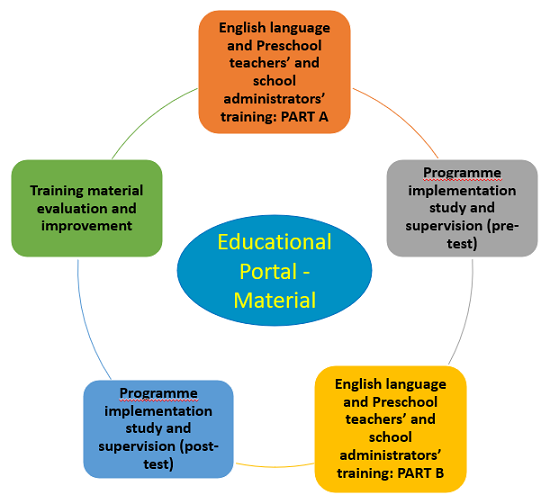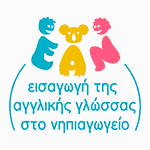The programme “TEACHER TRAINING FOR THE INTRODUCTION OF ENGLISH IN PRESCHOOL EDUCATION (EAN)”, (Code: MIS 5093563), is implemented in the context of the OP “Human Resources Development, Education and Lifelong Learning 2014-2020”. The Aristotle University of Thessaloniki (AUTH) is responsible for the design, organisation and coordination of the Programme There are two more partners in the programme, the National and Kapodistrian University of Athens (NKUA) and the Institute of Educational Policy (IEP).
The EAN programme aims to support the introduction of the English language through specially designed educational scenarios and creative activities for preschool children. This is an innovative action taking place in the context of the reforms introduced in the country’s education system and the priorities of the educational policy aimed at upgrading this system at all levels of education.
The EAN team is an interdisciplinary team consisting of university faculty members, and special teaching staff, technical personnel, researchers, and external collaborators. The Academically responsible, project leader and coordinator of the program is Thomai Alexiou, Professor of the Department of English Language and Literature, Aristotle University of Thessaloniki.
Duration
Participants
Asynchronous Training
Synchronous Training
CLIL educational material
The EAN main goals are:
- the design and implementation of the necessary training programme for English language teachers, preschool teachers and the school administrators involved
- monitoring and supervising the introduction of the English language in preschools and the collection of evidence from all the key stakeholders in the implementation of the programme
- the development of educational material in order to provide teacher support and,
- the design of the finalised form of teacher training educational material based on the needs of the participants and utilising the data that will be collected in the process of introducing the English language in preschools.
Based on the above, the following constitute some of the objectives of the programme:
- the investigation of perceptions and practices of the those involved in the context of the introduction of the English language in preschool (children, teachers, parents, etc.),
- the development of educational material
- the systematic supervision and continuous support of a significant number of schools in which the programme will be implemented,
- the training of school administrators and in-service English language and preschool teachers,
- the development and continuous enrichment of the training platform,
- the development of indicative educational material, and
- the creation of an Educational Portal.
HOW WILL THE ENGLISH LANGUAGE BE INTRODUCED INTO PRESCHOOLS?
The purpose of integrating the English language into preschools is the methodological and thematic enrichment of the preschool curriculum in relation to the linguistic and comprehensive development of preschool children, the strengthening of plurilingual awareness and intercultural communication, and the promotion of active citizenship in the context of contemporary multicultural societies (see Alexiou & Penteri, 2020).
The introduction of the English language in preschools:
- enriches the existing programme and becomes an integral part of their philosophy, supporting an exploratory and interdisciplinary approach as well as playful learning,
- is based on knowledge about the developmental characteristics of young children,
- is in accordance with the pedagogical principles of the preschool Curriculum,
- focuses on the communicative nature of language and the need for intercultural interaction,
- respects the holistic approach to learning and is realised through interdisciplinary creative activities,
- is based on the mutual and harmonious interaction and cooperation of preschool teachers and English language teachers.
Prerequisites for a child’s effective first contact with the foreign language are:
- specialised training of English language teachers regarding the introduction of the foreign language for preschool children as well as of preschool teachers.
- support of learning through educational material designed for this specific age group,
- cooperation of English language teachers with preschool teachers for the creation of an appropriate educational and pedagogical environment which will have the organisation and planning of the educational project in preschools as a starting point, with emphasis on the needs, inclinations and special interests of preschool children.
For the above reasons, mandatory training for Coordinators of Education as well as for English language teachers and preschool teachers was introduced in September 2021, in order to:
- understand the educational parameters and the importance of the introduction of English in preschools,
- understand the basic elements of the philosophy and operation of preschools as a basis for the development of a collaborative framework for the design and implementation of creative activities in English,
- develop appropriate methodology that connects the developmental characteristics of children of this age with the learning processes in the framework of the preschool curriculum and the methodology of English language learning for young children,
- cultivate a culture of collaboration for the planning and implementation of activities that adopt the principles of differentiated and inclusive education, contributing to the formation of a positive attitude towards plurilingualism and the intercultural approach by all participants in the educational process (children, parents, educators, etc.) and utilising digital and other tools to achieve collaboration.
Alexiou, T. & Penteri, E. (2020). Introductory Training Material for the Introduction of the English Language in Preschools-Pilot Implementation, IEP.
EAN PROGRAMME STRUCTURE
Sub-project 01 ” DESIGN – IMPLEMENTATION SUPERVISION OF THE PROGRAMME & DESIGN OF TRAINING AND EDUCATIONAL MATERIAL” – AUTH
- research tools design and utilisation of quantitative and qualitative methodological approaches to record the views and practices of the key stakeholders in the programme and reflect the learning outcomes of children
- production of educational material using multimodal elements relevant to the introduction of the English language in preschools, focusing on the holistic, socio-cultural, and interdisciplinary character of learning in preschools
- production of indicative multimodal educational material,
- creation of an educational portal for the requirements of the Programme.
Sub-project 02 “SCHOOL ADMINISTRATORS, PRESCHOOL AND ENGLISH LANGUAGE TEACHERS’ TRAINING ON THE INTRODUCTION OF ENGLISH IN PRESCHOOLS” – EKPA
- Exploitation of the educational material designed in the context of sub-project 01 and design of a training programme for school administrators using Blended Learning (asynchronous and synchronous training) to support teachers in their own training;
- Use of multimedia tools to support the work of school administrators and teachers.
Sub-project 03 “TEACHERS AND SCHOOL ADMINISTRATORS’ ASYNCHRONOUS TRAINING ON THE INTRODUCTION OF ENGLISH IN PRESCHOOLS” – IEP
Implementing training for teachers and school administrators in the context of asynchronous learning (material from Sub-project 01).
EAN is a comprehensive programme for the training and supervision of the introduction of English in preschools. In terms of methodology, as shown in Figure 1, it operates on four levels which are interconnected and complementary:
- English language and preschool teacher training in two (2) phases (Sub-projects 1 & 3),
- English language and preschool administrators’ training in two (2) phases (Sub-project 2),
- The study and supervision of the introduction of English in the preschool (pre-test and post-test procedures) (Sub-project 1)
- The fourth level will operate in parallel and will concern the creation of an educational portal including material in English which will constantly be enriched (Sub-project 1).
As part of the preparatory phase and during teacher training, the English language teachers who are placed in preschools attend the programme of the class during their assigned teaching hours in order for the children to become accustomed to them. At the same time, the English teachers themselves get to know the children, the preschool teachers, the school staff, as well as the school premises and the curriculum. The preschool teachers inform the parents/legal guardians about the introduction of the English language in the curriculum and prepare the children in accordance with the framework of implementation and the relevant instructions. In any case, the development of a positive climate of cooperation between the two teachers (English teacher and preschool teacher) is desired and supported by the entire educational community and the principal of the school unit.

